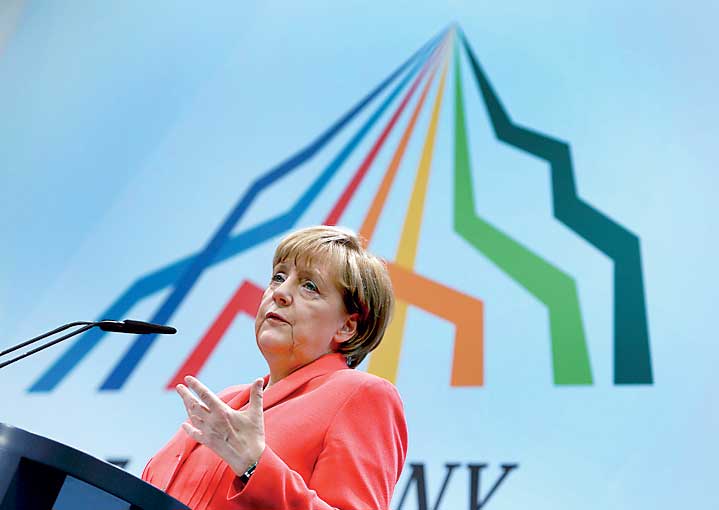Monday Feb 23, 2026
Monday Feb 23, 2026
Wednesday, 10 June 2015 00:00 - - {{hitsCtrl.values.hits}}

German Chancellor Angela Merkel holds a news conference during the G7 summit at Elmau Castle hotel in Kruen near Garmisch-Partenkirchen, southern Germany, June 8, 2015. Merkel urged Group of Seven (G7) leaders to commit to tough goals to cut greenhouse gases on the final day of their summit in Bavaria on Monday - Reuters
Leaders of the world’s major industrial democracies resolved on Monday to wean their energy-hungry economies off carbon fuels, marking a major step in the battle against global warming that raises the chances of a UN climate deal later this year.
The Group of Seven’s energy pledge capped a successful summit for host Angela Merkel, who revived her credentials as a ‘climate chancellor’ and strengthened Germany’s friendship with the United States at the meeting in a Bavarian resort.
Ties between the Cold War allies have been strained in the last couple of years by spying rows but Merkel appeared to put that behind her on welcoming US President Barack Obama, who declared their countries were ‘inseparable allies’.
Meeting in the picturesque Schloss Elmau at the foot of Germany’s highest mountain, the Zugspitze, the G7 leaders pressed Greece to accept painful economic reforms to resolve its debt crisis and struck a firm tone on Russia’s role in Ukraine.
They agreed that existing sanctions against Russia would remain in place until Moscow and Russian-backed rebels in eastern Ukraine fully respect a ceasefire negotiated in Minsk in February, and said they could escalate sanctions if needed.
On climate change, the G7 leaders pledged in a communique after their two-day meeting to develop long-term low-carbon strategies and abandon fossil fuels by the end of the century. “We commit to doing our part to achieve a low-carbon global economy in the long-term, including developing and deploying innovative technologies striving for a transformation of the energy sectors by 2050,” the communique read.
The leaders invited other countries to join them in their drive, saying they would accelerate access to renewable energy in Africa and intensify their support for vulnerable countries’ own efforts to manage climate change.
Merkel delivers
The summit revitalised Merkel’s green credentials, after concern among diplomats and environmental campaigners that Japan and Canada might torpedo her efforts.
The G7 stopped short of agreeing any immediate collective targets for reducing greenhouse gas emissions, which the Europeans had pressed their partners in the club to embrace. But they said a UN climate conference later this year should reach a deal with legal force, including through binding rules, to combat climate change.
Green lobby groups – routinely critical of the advanced economies’ record on climate change – welcomed the thrust of the summit commitments.
“Merkel’s G7 says ‘Auf Wiedersehen’ (farewell) to fossil fuels,” global activist network Avaaz declared in a statement.
‘Elmau delivered’, enthused environmental pressure group Greenpeace, adding that ‘the vision of a 100% renewable energy future is starting to take shape’.
The G7 leaders supported a reduction in global greenhouse gas emissions within a range recommended by the United Nations climate change panel, and backed a global target for limiting the rise in average global temperatures to 2 degrees Celsius (3.6 Fahrenheit) compared with pre-industrial levels.
Their accord helps set up the UN Paris conference, at which some 200 countries will try to reach agreement on limiting the rise in global temperatures to 2 degrees Celsius and seal a new worldwide agreement to curb greenhouse gas emissions.